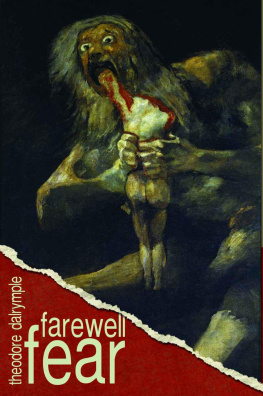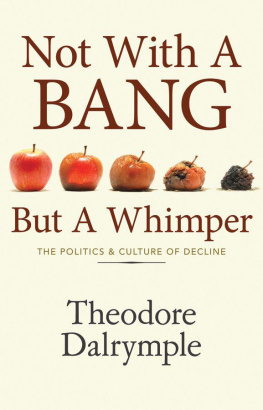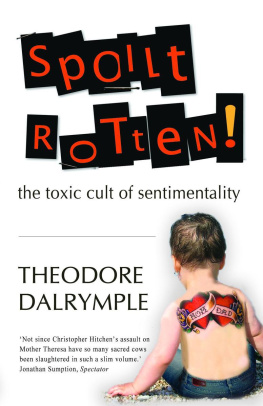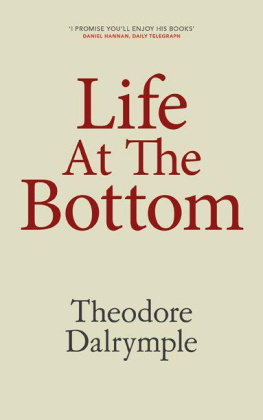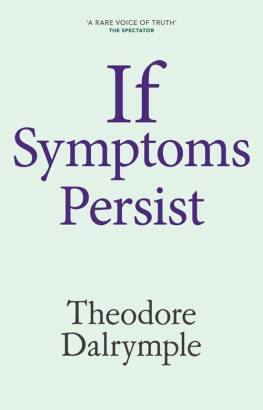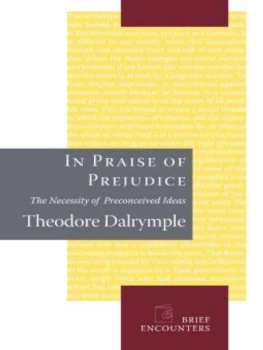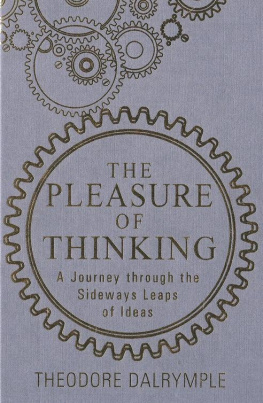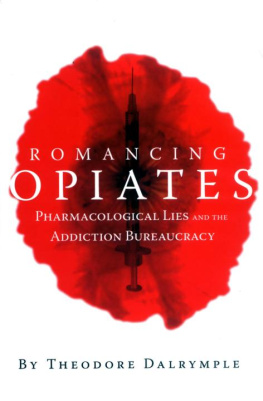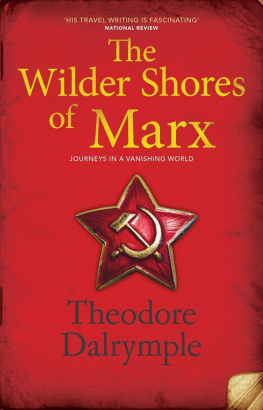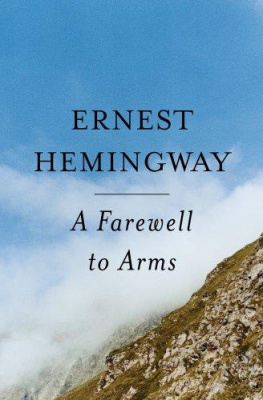Theodore Dalrymple - Farewell Fear
Here you can read online Theodore Dalrymple - Farewell Fear full text of the book (entire story) in english for free. Download pdf and epub, get meaning, cover and reviews about this ebook. year: 2012, publisher: New English Review Press, genre: Art. Description of the work, (preface) as well as reviews are available. Best literature library LitArk.com created for fans of good reading and offers a wide selection of genres:
Romance novel
Science fiction
Adventure
Detective
Science
History
Home and family
Prose
Art
Politics
Computer
Non-fiction
Religion
Business
Children
Humor
Choose a favorite category and find really read worthwhile books. Enjoy immersion in the world of imagination, feel the emotions of the characters or learn something new for yourself, make an fascinating discovery.
- Book:Farewell Fear
- Author:
- Publisher:New English Review Press
- Genre:
- Year:2012
- Rating:4 / 5
- Favourites:Add to favourites
- Your mark:
- 80
- 1
- 2
- 3
- 4
- 5
Farewell Fear: summary, description and annotation
We offer to read an annotation, description, summary or preface (depends on what the author of the book "Farewell Fear" wrote himself). If you haven't found the necessary information about the book — write in the comments, we will try to find it.
Farewell Fear is a collection of Theodore Dalrymples finest essays covering a wide range of topics written for New English Review between 2009 and 2012 plus one or two which have never been published before. His first such collection was the best-selling Anything Goes (2011).
Farewell Fear — read online for free the complete book (whole text) full work
Below is the text of the book, divided by pages. System saving the place of the last page read, allows you to conveniently read the book "Farewell Fear" online for free, without having to search again every time where you left off. Put a bookmark, and you can go to the page where you finished reading at any time.
Font size:
Interval:
Bookmark:
Table of Contents
Farewell Fear
Theodore Dalrymple
Copyright Anthony M. Daniels, 2012
All rights reserved. No part of this book may be reproduced in any form or by any means, electronic or mechanical, without permission in writing from the publisher except by reviewers who may quote brief passages in their reviews.
Published by New English Review Press
a subsidiary of World Encounter Institute
PO Box 158397
Nashville, Tennessee 37215
Cover Design by Kendra Adams
ISBN: 978-0-9854394-8-4
E-Book edition
N  EW ENGLISH REVIEW PRESS
EW ENGLISH REVIEW PRESS
newenglishreview.org
Preface
R e flection on the small change of life soon leads to deeper questions at least, such has long been my belief, or perhaps my hope. It is also my hope that the following short essays, published by the New English Review over a period of three years, bear out my belief.
We take a lot of pride, partly justified, in the fact that ours is the age of information. It is certainly true, as I have found, that it is now possible to do in an afternoon, comfortably sitting in ones room, research that would once have taken months, if it could have been done at all. For example, I no longer have to trudge to the library to look up a single entry in the Dictionary of National Biography : what once took up a whole afternoon, and sapped my energy, both prospectively and retrospectively, now takes considerably less than five minutes. It is wonderful.
But information without perspective here I shamefacedly admit that I am quoting myself is a higher form of ignorance. Information, be it ever so copious, will not by itself result in truth, much less in wisdom. Reflection on the meaning of information is at least as important as the information itself. The best informed man is not necessarily the wisest, therefore, or the surest guide to any subject.
I hope these little essays conduce to wisdom and intellectual honesty (another frequent casualty of a surfeit of information).
I am grateful to Rebecca Bynum on a number of grounds: first for having asked me to write for the New English Review ; second for suggesting that my essays might be put in a book; and third for her editorial assistance. Thank you.
1 - What the Hedgehog Knows
B eing a scholar of nothing, I allow my intellectual interest to wander hither and yon. Or perhaps it is because I allow my intellectual interest to wander hither and yon that I am a scholar of nothing. Be that as it may, I admire specialists and am grateful to them for their researches, but I could never be one myself. Whenever it is imperatively necessary for me to read a book pursuant to something that I am currently writing about, I immediately lose interest in it, as I lose my appetite in a restaurant if I wait too long for the food to arrive; and then I want to read about something else entirely.
And so it was when, at a time when I was supposed to be writing about the methadone treatment of heroin addiction (methadone kills more people in Dublin than heroin), I wandered into a bookshop in Lower Baggot Street in Dublin that sold cheap remaindered books, that I bought a book about hedgehogs. It wasnt a very good book, as it turned out, and was written in that jocular fashion in which people who are enthusiastic or passionate about something nowadays feel it necessary to write, for fear of appearing solemn or of revealing too much of themselves. But the book was just what I wanted to divert me from what I ought to have been reading.
I have always found hedgehogs rather appealing, though I am afraid that (before I bought this book) my knowledge of them had not advanced very much beyond that acquired when I read The Tale of Mrs Tiggy-Winkle at the age of six. Of course, I knew that hedgehogs did not really do the laundry for other creatures such as wrens and rabbits; and from personal observation I knew that, far from being clean, they were often alive with fleas. But I did not know that those fleas were specific to hedgehogs; numbered on average 100 per host; appeared so prominent to casual observers such as I because the hedgehogs that most people encounter are ill and the fleas are preparing to abandon the sinking insectivore, as it were; or that the flourishing hedgehogs of New Zealand (that were introduced into the country in the nineteenth century to Anglicise its landscape and fauna) do not have fleas, and that therefore the fleas serve no symbiotic purpose for the hedgehog.
There were other facts I learned, for example that the top speed of a hedgehog is five and a half miles an hour, though the book did not inform the reader how long it can keep it up. Even in my early sixties, my top speed is probably quite impressive; less so is the number of yards for which I can sustain it. I learnt also that the hedgehog wanders up to a mile and a half at night, and that it hibernates not from metabolic necessity to avoid the cold but because of the decline in its food supply.
Part of the delight of these facts for me was their complete irrelevance to anything else with which I normally concern myself. This reassured me that my interest in the world is, at least in part, disinterested, that I like knowledge for its own sake: and since knowledge for its own sake is a noble thing, that I am in part, or at least sometimes capable of being in part, noble.
But the book also promised (though it did not really deliver) an insight into the peculiar human world of hedgehog enthusiasts, of whose existence I became aware quite by chance.
A friend of mine, aware that I did not have a television, desired to prove to me the genius of the British comedian, Sacha Baron Cohen, and therefore sat me down to watch an episode of the television series in which Baron Cohen plays Ali G, a suburban white boy who wants to be a black ghetto boy. And Baron Cohen mastered the gestures and patois of the ghetto culture brilliantly.
Many prominent people were invited to interview by Ali G; the circumstances and reasons for the interviews were grossly misrepresented to them, and in the event they were often made to look very foolish since they did not understand the joke, or indeed that it was a joke. Some people might say that public figures such as politicians were fair game, that they could have been expected to look after themselves; but if we expect politicians not to deceive us, surely it is incumbent on us not to deceive them. The joke was a good one (if quickly grasped and therefore limited); but the extraction of a laugh at someones expense, even if that person is not estimable, procured by unethical behaviour, does not justify the unethical behaviour necessary to extract it. Entertainment is not the only good, much less the highest good.
In any case, the people satirised by Ali G in the episode which my friend showed me were not public figures; they had not sought the limelight, nor were they the kind of people who in any way deserved cruel mockery. They were obviously kind and harmless, completely nave in the ways of television or show business. They were people who went round the countryside rescuing injured hedgehogs, restoring them to health and returning them to nature. (One of the questions that the book answered was whether rescued hedgehogs survive when returned to nature, the answer being in the affirmative).
The kindness and innocence of the hedgehog rescuers was obvious and yet they were held up to ridicule, only that millions of people might have a moments laughter. I thought this repellently exploitative and unscrupulous: satire is often necessarily hurtful to the satirised, but its object should be worthy of satire. There is not so much kindness and innocence in the world that it should be publicly mocked.
In fact, it is rather difficult to believe that those who interest themselves practically in the welfare of hedgehogs can be bad people. When I bought the book, the man at the till who had a kind and gentle face himself said that he had thought the book might be interesting. I mentioned that there were surprisingly many people who interested themselves in hedgehogs, and that they were probably very different in character from those (of whom there were also many) who interested themselves in snakes.
Font size:
Interval:
Bookmark:
Similar books «Farewell Fear»
Look at similar books to Farewell Fear. We have selected literature similar in name and meaning in the hope of providing readers with more options to find new, interesting, not yet read works.
Discussion, reviews of the book Farewell Fear and just readers' own opinions. Leave your comments, write what you think about the work, its meaning or the main characters. Specify what exactly you liked and what you didn't like, and why you think so.

